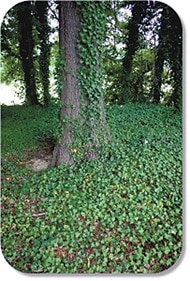
Kudzu, privet and Japanese honeysuckle are the ones that are most familiar. However, several common home landscape plants have invasive characteristics.
English ivy is frequently planted as a groundcover in the landscape. Left unchecked, it grows aggressively, and it can rapidly take over an area. The vines climb trees eventually killing them as well as making them more susceptible to being blown over in wind storms.
Vincas or periwinkles are another favorite ground cover. The plant has a violet colored flower and is a perennial woody vine. They spread by developing adventitious roots at the nodes that form dense mats and extensive infestations. The plants thrive in shaded areas, such as under tree canopies.
Several other ornamental plants have invasive tendencies. The southern magnolia is native to South Georgia, but in North Georgia it can escape cultivation and has invasive tendencies. Leatherleaf mahonias, burning bushes, nandinas, and the ornamental grass miscanthus have invasive characteristics and are increasingly being found growing in natural areas.
Some invasive plants are worse than others, but all have the potential to become destructive to local environments over time. Those that have escaped cultivation in more recent times can remain at low levels in scattered locations for a period of time known as the “lag phase.” Over the years, they become more invasive in nature and begin spreading at a more rapid rate. Privet is an example of this phenomenon. The plant was imported to be used as a hedge shrub during the 1800s. Until the 1950s, it was minimally invasive. Then it began to spread rapidly. Now, privet is one of the most destructive invasive plants in the southeastern United States.
What can homeowners do to prevent the spread of invasive plants? Most importantly avoid planting them. Instead, choose native plants or non-native plants that do not have the potential to grow out of control. If you decide to use ornamental plants with invasive tendencies, keep them under control by pruning them and by removing ones that are found growing in areas where they are not desired. To learn more, refer to the website of the Georgia Exotic Pest Plant Council at www.gaeppc.org.
Invasive plants have the potential to do significant damage to ecosystems, and every effort must be made to control their spread.
Winter is a good time to decide on what to plant in your yard. The 2014 Gwinnett County Extension plant sale will be offering a variety of flowering plants, fruit trees, and other plants of interest. Details are on the Gwinnett Extension website at http://www.gwinnettextension.com
Timothy Daly is Agricultural and Natural Resource Agent with Gwinnett County Extension. He can be reached at 678-377-4010 or tdaly@uga.edu

